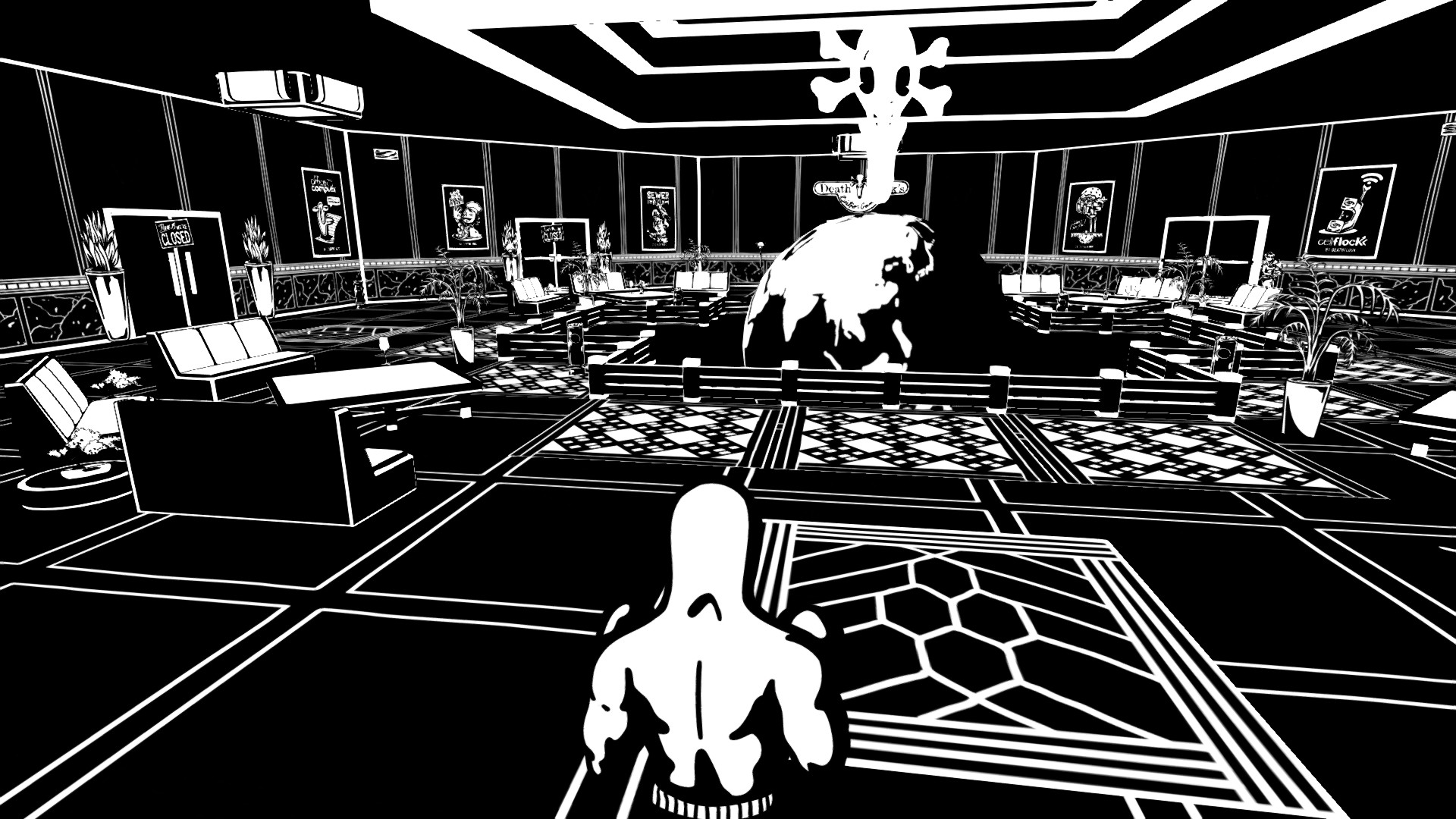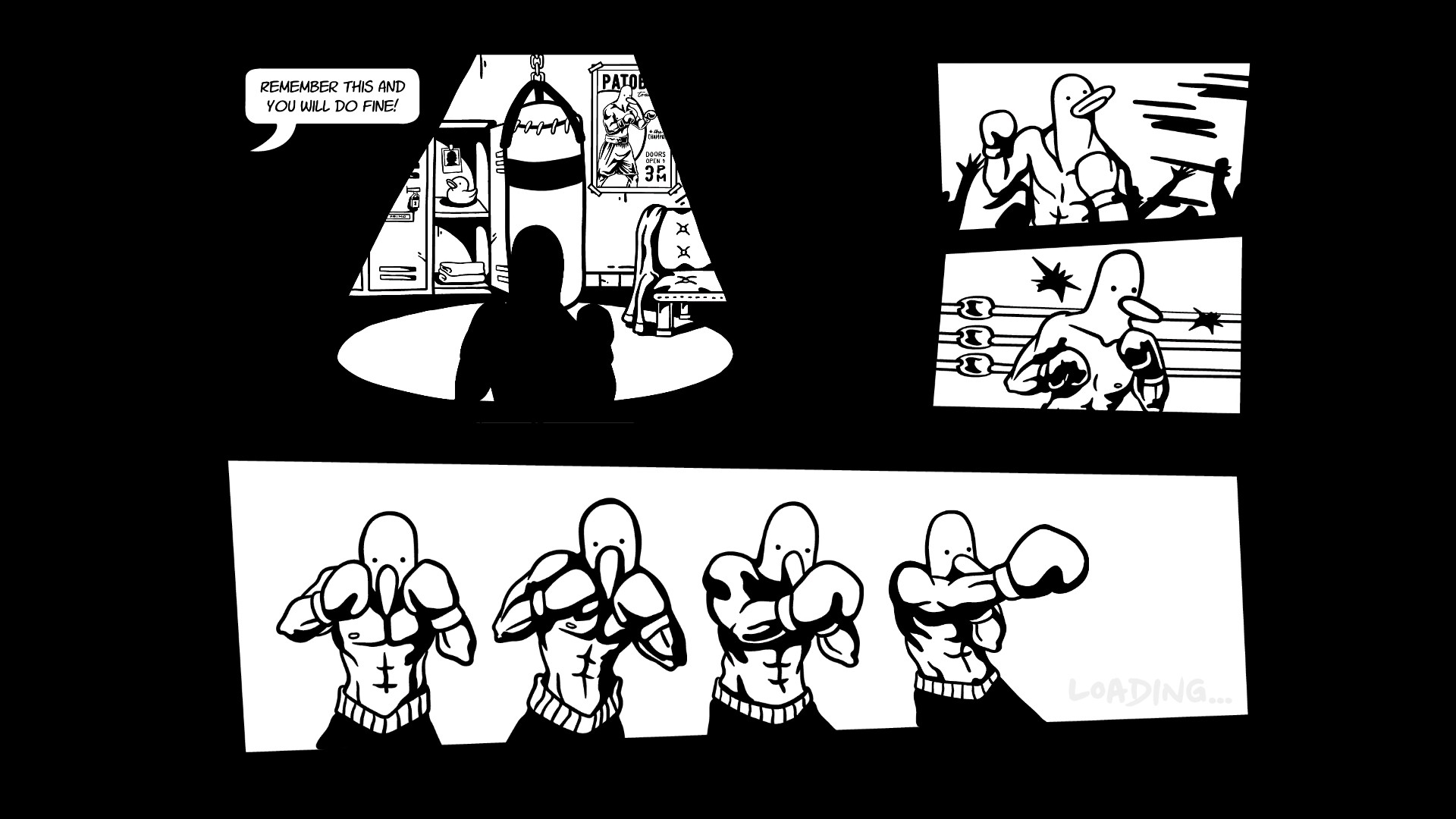Pato Box is a boxing game with a noir comic art-style where you're a duck for some reason
It also has 3D explorable environments, and an evil corporation called 'Deathflock'.
A clever piece of misdirection at the beginning of Pato Box sums up the experience perfectly. It puts you in a boxing match reminiscent of the original Punch-Out!! and teaches you the basics of how to fight, then has you lose and wake up in a 3D environment of long, snaking corridors and prop-filled rooms. It's a clear statement of intent. Pato Box isn't going to be just a Punch-Out!! clone, but instead use it as a framework to try out strange ideas.
In Pato Box, you play an anthropomorphic boxing duck who must use his fists to defeat Deathflock, an evil corporation who lost you an important match and left you for dead. That really is what it's about. You explore Deathflock's headquarters, search for notes about the shadowy organization's intentions, and talk to NPCs. At the end of levels you face off against deadly foes, including a knife-wielding chef that will have you catching ingredients to throw into a pot and a mad rhythm-obsessed scientist. Every one of them has a unique fighting style and their own history with the protagonist for the player to uncover during the course of the story.
"We always wanted to do something old school, you know," says lead programmer Antonio Gutierrez. "We wanted to take a format that already exists and see what we can do with it. That's why we did a story mode, with 3D exploration and everything."

"Some members of the team didn't like the fact that in Punch-Out!! you only fight the bosses and you never get to know their story or what are their motivations to be in the championship," adds producer Samir Duran. "[Adding the exploration] was an interesting way to tell the story and really give you an opportunity to get to know the other characters in the game."
The exploration isn't just a throwaway design choice. As you explore each section of the headquarters, you encounter obstacles that will then be used in the next boss fight. For instance, before fighting the security guard Brauch, you come across numerous timed lasers, which will come into play when you meet her.
Despite being a fairly ridiculous premise for a game, the team behind Pato Box wanted to play the story straight. Nowhere is this more apparent than in the visual style, which is intended to be reminiscent of the work of Frank Miller. It deliberately evokes the feel of Sin City through the high contrast black-and-white presentation and dramatic scene transitions that mimic the panels of his gritty noir stories. It's a decision that only heightens the absurdity of the game, as you become increasingly more invested in the plight of the duck-headed protagonist.

Pato Box also has some fantastic animations, which mirror the exaggerated movements and expressions you'd find in a comic book. The style was a first for the studio, having never worked on traditional animation in the past and was created with the help of Adobe Suite and the animation software Toon Boom.
Keep up to date with the most important stories and the best deals, as picked by the PC Gamer team.
We wanted to create something bizarre, but in a way that you immediately looked at the game and noticed it was something unique
Antonio Gutierrez
"For each of the bosses, we wanted to do something different," says Gutierrez. "The animations look really fluid, but we don't use a lot of frames actually, because we wanted [that] style of a comic book. But we compliment the animations with all the particles and the movement."
Pato Box is the product of a fledgling community of independent game designers coming out of Mexico. Game development has taken off in the country in recent years with a bunch of factors helping its growth. One of the biggest is the newfound attention of the Mexican government and trust funds like Pro México that support game development in the country.
There are also plenty of other contributions, like the arrival of Kickstarter in the country in 2016, the creation of industry events like DEVHR, and the support and accessibility offered by platforms like Unity. All of these have been invaluable to Bromio while developing Pato Box. They've made resources more widely available for the team and have given them the funds to pursue ideas.
"The indie scene here in Mexico has been growing since like five years ago more or less," says Duran. "The government started giving more events to publish games, so the indie gaming movement started to flourish in the country. There are still not a lot of developers here. I think they are like 40 or 50 enterprises here in Mexico for games, but as for games published by indie developers there must be less than 20 games or 10 games. So, when one game comes up from Mexico, it is a really big surprise here."
I ask Duran how he feels about the press and player reaction to the game so far. "It is great to see the kind of response [we've got]," he says. "We wanted to create something bizarre, but in a way that you immediately looked at the game and noticed it was something unique and something you've never seen before. We wanted to turn the tables on the player and tell the player this is not going to be how you expected." It's safe to say they've succeeded.
Pato Box is available now on Steam.

